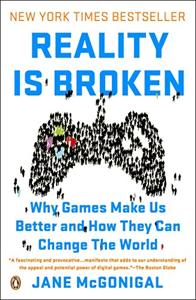
Want to learn the ideas in Reality Is Broken better than ever? Read the world’s #1 book summary of Reality Is Broken by Jane McGonigal here.
Read a brief 1-Page Summary or watch video summaries curated by our expert team. Note: this book guide is not affiliated with or endorsed by the publisher or author, and we always encourage you to purchase and read the full book.
Video Summaries of Reality Is Broken
We’ve scoured the Internet for the very best videos on Reality Is Broken, from high-quality videos summaries to interviews or commentary by Jane McGonigal.
1-Page Summary of Reality Is Broken
Overview
Video games, such as those for the Xbox 360 and PS3, are often in the news because of violence.
However, there are more types of games than just violent ones. In fact, most people who play video games don’t confuse them with reality and aren’t violent. And the benefits that come from playing video games are great for learning skills that can help us in our daily lives. So we should all spend more time playing video games instead of watching TV or doing other things that do not benefit us as much as video games do.
Even chores can be fun. People love playing games and they’re very engaging. There are also many lessons that we can learn from gaming. For example, a game developer was able to get its players involved in solving real-world problems by creating an engaging game for them to play.
Big Idea #1: Games provide more motivation and rewards than “real life” does.
Video games are more popular than ever. In fact, 97 percent of youths play video games. However, why do we play them? That’s the question that this passage tries to answer by citing a study and providing its own insights.
Many people believe that the popularity of movies is due to their ability to distract us from reality.
While it’s true that people are playing more video games, the real reason is because they can provide a social experience that might not be available otherwise.
For example, social media sites like Facebook and Twitter allow people to connect with each other in a way that wasn’t possible before.
Games give people a sense of optimism. They know they can win and that the game is beatable. Reality doesn’t provide people with anything similar to games, so they’re left without hope or solace when their attempts at solving problems fail.
Games are important because they can help people become happy. People need fun and excitement in their lives, or else they’ll be depressed. Games have missions and secrets that provide a bit of excitement to otherwise dull lives, thus preventing unhappiness.
Games also provide us with a feeling of triumph over adversity.
You’ve likely experienced the thrill of victory when you beat a boss or complete a difficult mission in a game. That moment is one of celebration and triumph, so much so that you jump from your seat with arms raised over your head while letting out an exuberant scream.
Big Idea #2: Playing games is a sustainable way of providing ourselves with better lives.
Imagine this scenario: You work in a job you hate every day. Your commute is two hours each way, and it’s along the busiest highway in the city. That sounds terrible!
Of course, people don’t want to live a life like this. It makes them feel depressed and lonely. However, there is a solution: video games. Video games are not the same as other jobs because they do not make you feel miserable or bored; instead they give you positive emotions by letting you accomplish goals and win rewards in the game. Although many believe that money gives us happiness, video games can actually provide us with intrinsic rewards that cannot be found anywhere else but must be made within ourselves.
Games are great because they provide instant gratification and can be played endlessly. Unlike other things that make us feel good, playing games is sustainable because we get to play them over and over again.
Instant gratification is a huge advantage of the online world. In real life, we usually don’t get feedback or acknowledgement right away.
Games are different; you can tell when you’ve achieved something.
For example, if you make a good pitch in the workplace and your clients or bosses don’t agree with it, then you have to wait for them to let you know their answer. But if you capture the enemy’s base in a game, then immediately after that happens you’ll know whether or not your goal has been achieved.





